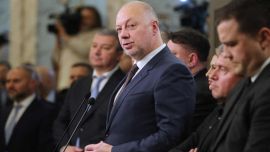Virtually the first task facing the new Congress is the approval of what gave birth centuries ago to parliamentary institutions worldwide in general and to the United States in particular (“No taxation without representation”) – namely, the budget, the only legislation which must inexorably clear the legislative branch. Elsewhere, there has been vast institutional evolution since originating in the need to keep warlike or extravagant monarchs in pocket but in Argentina the budget continues to be something of a bad joke. Here the budget has not only been a set of wildly optimistic forecasts spewing wishful thinking for propaganda purposes but also a tool for political manipulation – imposing disciplinary cuts while within the straitjacket of convertibility and, in this century, grossly undershooting the inflation and/or growth forecasts in order to have extra revenues to fuel slush funds and political machines.
Given that background, there is little unique about the 2022 Budget explained in detail by Economy Minister Martín Guzmán to Congress last Monday – the difference is the electoral context with the more precarious government numbers resulting from last month’s midterms (including the loss of their overall majority in the Senate). Guzmán presented the rosy picture of a “double recovery” from recession and pandemic with possibly double-digit growth this year and a halved fiscal deficit – he also trotted out the typical unrealistically optimistic forecasts for next year (already overtaken by reality in some cases) such as four percent economic growth, ditto for real wages, 33 percent inflation and a trade surplus of over US$9 billion.
That budget was full of holes, as an empowered and increasingly diversified opposition was only too keen to point out from various angles (including the brand-new parallel Radical caucus drafting its own parallel budget). We might start by questioning “double recovery” – can the minister be so sure that the Covid-19 pandemic is really over with 2022 certain to start at least with escalating Omicron jitters? If there is double-digit growth this year, it is obviously cancelled out by similar shrinkage last year and is thus pretty meaningless – far more modest levels of growth in 2022 remain entirely possible but so does a collapse from the mega-crisis which has been looming so long.
As it happens, the worst enemies of Guzmán’s budget are perhaps not so much the verbal critics from opposition ranks but the Frente de Todos deputies of his own government, who have thrown in a host of extra spending items unaccompanied by any funding (public works to the tune of trillions of pesos, tax breaks, duty-free zones, funding boosters for provinces and ministries, etc.) with everybody playing Father Christmas. But even taking Guzmán’s number-crunching at face value without all this extra ballast, he confronted a couple of fundamental problems in balancing the budget.
Firstly, a lower fiscal deficit is only viable if the government finally goes through with the long overdue action to update public utility billing and transport fares to reality but this would surely send inflation way through its 33 percent cap (the opposition coalition founded by Mauricio Macri could tell him plenty about that) – Guzmán cannot thus have his cake and eat it too with a lower deficit, lower inflation and updated public service pricing all at once but must choose his priorities.
Yet a balanced budget is also vulnerable from other angles. Two of Guzmán’s key weapons for funding the deficit are the peso bond market and credits from multilateral organisations. But the former depends on continued confidence when the Leliq snowball risks spinning out of control while the government expectations of up to US$12 billion in multilateral funding are several times the annual average and in any case hinge on an agreement with the International Monetary Fund, which might well come through too late, if at all. The failure of either source of funding would inevitably lead to more money being printed and more inflation.
As this editorial was being written, Congress had rejected the budget but even if that proves final (with the original draft version analysed above ending up as so much waste paper), Guzmán still needs to come up with a new mix of tax increases and spending cuts if he wants to control the deficit – at least these lines might serve to show some of the problems involved. President Alberto Fernández might dream of a new capital (which did not help his predecessor Raúl Alfonsín whom he was praising so much earlier this month) but there are more immediate problems.






















Comments